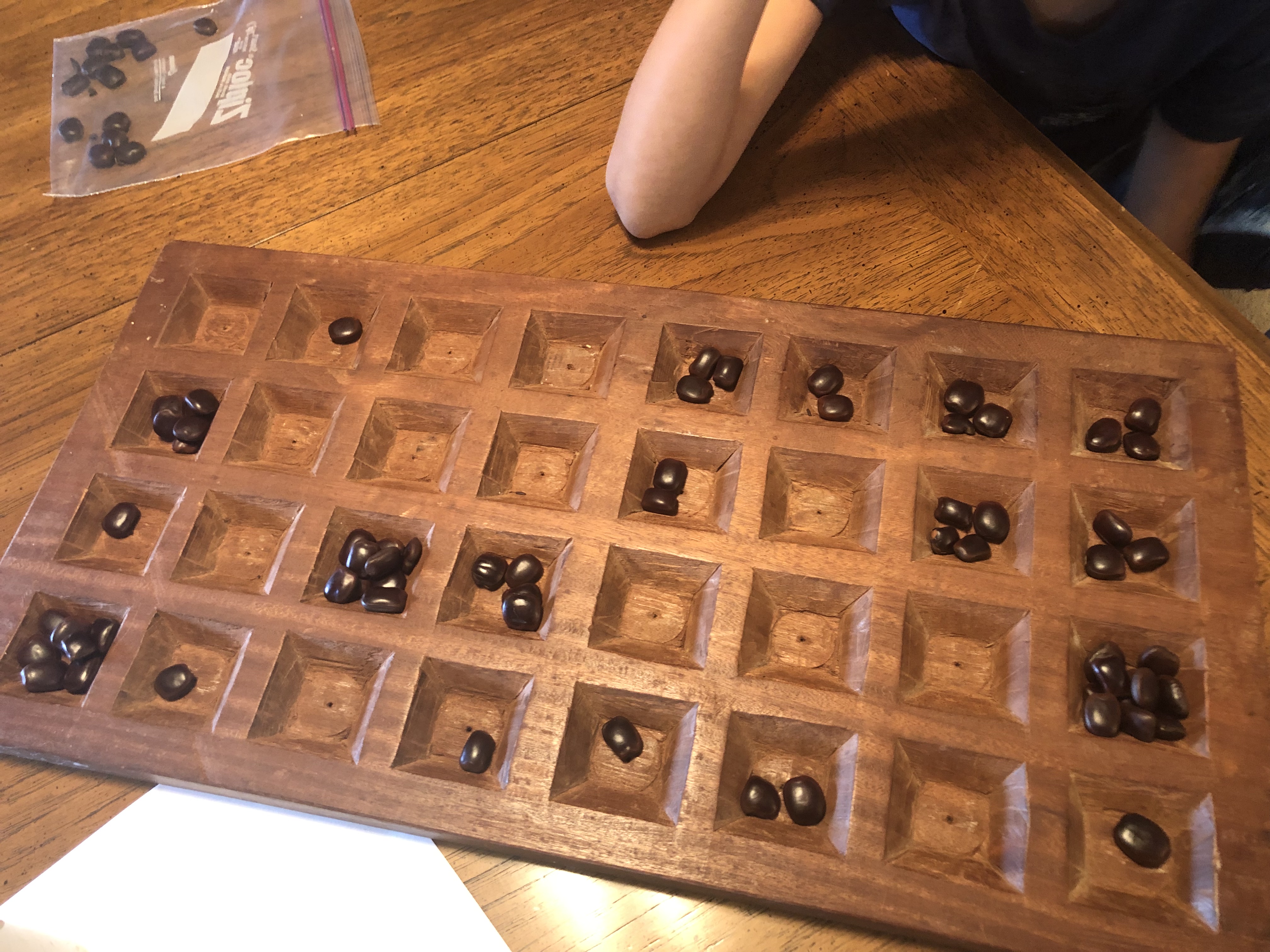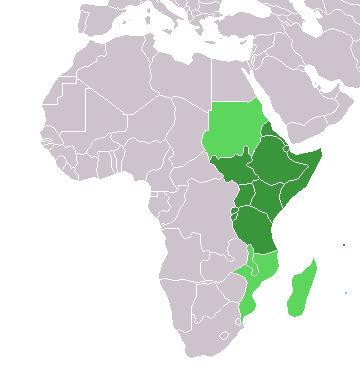|
Isolo
Isolo (also known as Isumbi) is a traditional mancala game played by the Sukuma people in northern Tanzania. The rules of the game come in three variants, respectively for women, boys and men. Equipment The board used to play Isolo (also known as ''isolo'') comprised 4 rows of 8 pits each, and 64 seeds (usually ''Caesalpinia bonduc'' seeds) are used; the equipment is thus the same as that of many other East African mancalas such as Bao and Omweso. Also as in Bao and Omweso, each player controls half of the board (two rows). Some Isolo boards feature two larger pits that are not part of the game but might be used to keep the score. Rules Rules for women At game setup, two seeds are placed in each pit. At her turn, the player takes the seeds from any of her pits holding two or more seeds, and sows them counterclockwise in her two rows. If the last seed falls in an empty pit, the turn is over. If the last seeds falls in a non empty pit of the inner row, and there are any seeds in t ... [...More Info...] [...Related Items...] OR: [Wikipedia] [Google] [Baidu] |
Kisolo
Kisolo (also spelled Chisolo) is a traditional mancala game played by the Luba, Lulua and Songye peoples of DR Congo and Zimbabwe. It is closely related to other East African mancalas such as Bao, Bao Kiarabu, Coro and Isolo Isolo (also known as Isumbi) is a traditional mancala game played by the Sukuma people in northern Tanzania. The rules of the game come in three variants, respectively for women, boys and men. Equipment The board used to play Isolo (also known as ....  The board used to play Kisolo varies in size depending on common practice and re ...
The board used to play Kisolo varies in size depending on common practice and re ...
[...More Info...] [...Related Items...] OR: [Wikipedia] [Google] [Baidu] |
Mancala
The mancala games are a family of two-player turn-based strategy board games played with small stones, beans, or seeds and rows of holes or pits in the earth, a board or other playing surface. The objective is usually to capture all or some set of the opponent's pieces. Versions of the game date back past the 3rd century and evidence suggests the game existed in Ancient Egypt. It is among the oldest known games to still be widely played today. Names and variants The name is a classification or type of game, rather than any specific game. Some of the most popular mancala games (concerning distribution area, the numbers of players and tournaments, and publications) are: * Ayoayo, played by the Yoruba people in Nigeria; similar to Oware * Alemungula or gebeta (ገበጣ)– played in Sudan and Ethiopia. * Ali Guli Mane or Pallanguzhi – played in Southern India. * Bao la Kiswahili – played in most of East Africa including Kenya, Tanzania, Comoros, Malawi, as we ... [...More Info...] [...Related Items...] OR: [Wikipedia] [Google] [Baidu] |
Sukuma People
The Sukuma are a Bantu ethnic group from the southeastern African Great Lakes region. They are the largest ethnic group in Tanzania, with an estimated 10 million members or 16 percent of the country's total population. Sukuma means "north" and refers to "people of the north." The Sukuma refer to themselves as ''Wasukuma'' (plural) and Msukuma (singular). Homeland The Sukuma live in northwestern Tanzania on or near the southern shores of Lake Victoria, and various areas of the administrative districts of the Mwanza, southwestern tip of Mara Region, Simiyu Region and Shinyanga Region. The northern area of their residence is in the Serengeti Plain. Sukuma families have migrated southward, into the Rukwa Region and Katavi Region, encroaching on the territory of the Pimbwe. These Sukuma have settled outside Pimbwe villages. The Sukuma land is mostly a flat, scrubless savannah plain between elevation. Twenty to forty inches () of rain fall from November to March. High temperatures ... [...More Info...] [...Related Items...] OR: [Wikipedia] [Google] [Baidu] |
Tanzania
Tanzania (; ), officially the United Republic of Tanzania ( sw, Jamhuri ya Muungano wa Tanzania), is a country in East Africa within the African Great Lakes region. It borders Uganda to the north; Kenya to the northeast; Comoro Islands and the Indian Ocean to the east; Mozambique and Malawi to the south; Zambia to the southwest; and Rwanda, Burundi, and the Democratic Republic of the Congo to the west. Mount Kilimanjaro, Africa's highest mountain, is in northeastern Tanzania. According to the United Nations, Tanzania has a population of million, making it the most populous country located entirely south of the equator. Many important hominid fossils have been found in Tanzania, such as 6-million-year-old Pliocene hominid fossils. The genus Australopithecus ranged across Africa between 4 and 2 million years ago, and the oldest remains of the genus ''Homo'' are found near Lake Olduvai. Following the rise of '' Homo erectus'' 1.8 million years ago, humanity spread ... [...More Info...] [...Related Items...] OR: [Wikipedia] [Google] [Baidu] |
East Africa
East Africa, Eastern Africa, or East of Africa, is the eastern subregion of the African continent. In the United Nations Statistics Division scheme of geographic regions, 10-11-(16*) territories make up Eastern Africa: Due to the historical Omani Empire and colonial territories of the British East Africa Protectorate and German East Africa, the term ''East Africa'' is often (especially in the English language) used to specifically refer to the area now comprising the three countries of Kenya, Tanzania, and Uganda. However, this has never been the convention in many other languages, where the term generally had a wider, strictly geographic context and therefore typically included Djibouti, Eritrea, Ethiopia, and Somalia.Somaliland is not included in the United Nations geoscheme, as it is internationally recognized as a part of Somalia. *Tanzania, Kenya, Uganda, Rwanda, Burundi, Democratic Republic of Congo and South Sudan are members of the East African Community. The firs ... [...More Info...] [...Related Items...] OR: [Wikipedia] [Google] [Baidu] |
Omweso
Omweso (sometimes shortened to Mweso) is the traditional mancala game of the Ugandan people. The game was supposedly introduced by the Bachwezi people of the ancient Bunyoro-kitara empire of Uganda. Nowadays the game is dominated by Ugandan villagers. It is a very hard and fast game said to keep one's mind high and ever excited, which can make it addictive. The equipment needed for the game is essentially the same as that of the Bao game (found in Tanzania and neighbouring countries). Omweso is strictly related to a wide family of mancalas found in eastern and southern Africa; these include Coro in the Lango region of Uganda, Aweet in Sudan, ǁHus in Namibia, Kombe in Lamu (Kenya), Mongale in Mombasa (Kenya), Mongola in Congo, Igisoro in Rwanda, and Kiela in Angola. The name "Omweso" is derived from Swahili word ''michezo'', which means "game". Rules Equipment Omweso requires a board of 32 pits, arranged with eight pits lengthwise towards the players, and four pits de ... [...More Info...] [...Related Items...] OR: [Wikipedia] [Google] [Baidu] |
Mancala
The mancala games are a family of two-player turn-based strategy board games played with small stones, beans, or seeds and rows of holes or pits in the earth, a board or other playing surface. The objective is usually to capture all or some set of the opponent's pieces. Versions of the game date back past the 3rd century and evidence suggests the game existed in Ancient Egypt. It is among the oldest known games to still be widely played today. Names and variants The name is a classification or type of game, rather than any specific game. Some of the most popular mancala games (concerning distribution area, the numbers of players and tournaments, and publications) are: * Ayoayo, played by the Yoruba people in Nigeria; similar to Oware * Alemungula or gebeta (ገበጣ)– played in Sudan and Ethiopia. * Ali Guli Mane or Pallanguzhi – played in Southern India. * Bao la Kiswahili – played in most of East Africa including Kenya, Tanzania, Comoros, Malawi, as we ... [...More Info...] [...Related Items...] OR: [Wikipedia] [Google] [Baidu] |
Traditional Mancala Games
A tradition is a belief or behavior (folk custom) passed down within a group or society with symbolic meaning or special significance with origins in the past. A component of cultural expressions and folklore, common examples include Holiday, holidays or impractical but socially meaningful clothes (like court dress, lawyers' wigs or military officers' spurs), but the idea has also been applied to social norms such as greetings. Traditions can persist and evolve for thousands of years—the word ''tradition'' itself derives from the Latin ''tradere'' literally meaning to transmit, to hand over, to give for safekeeping. While it is commonly assumed that traditions have an ancient history, many traditions have been invented on purpose, whether that be political or cultural, over short periods of time. Various Academic discipline, academic disciplines also use the word in a variety of ways. The phrase "according to tradition", or "by tradition", usually means that whatever informatio ... [...More Info...] [...Related Items...] OR: [Wikipedia] [Google] [Baidu] |





